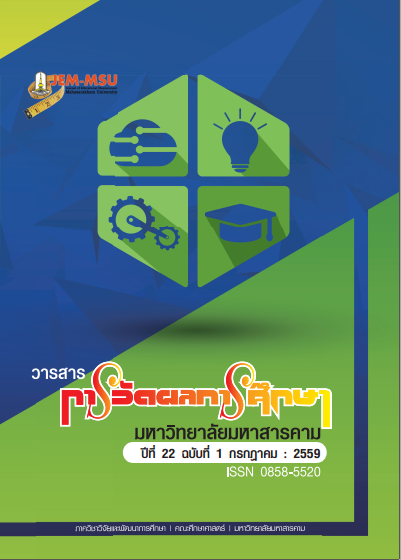The Development of Game Learning Model Bases on Constructivist Enhancing Collaboration and Problem-solving Skill for Sixth-Grade Students
Main Article Content
Abstract
This research aims 1) to development of game learning model based on
constructivist enhancing collaboration and problem-solving skills for sixth-grade students 2)
to study collaboration skill of the students 3) to study problem-solving skill of the students
4) to study educational achievement and 5) to study the satisfaction of the students. In this
research, researcher takes the form of developmental research type II. The sampling of this
study is sixth-grade students who register for the second semester of academic year 2013,
Nasenuan School amount 21 persons with cluster random sampling. The instruments used
in this research were : 1) game learning model based on constructivist enhancing
collaboration and problem-solving skill 2) a 11- item of collaboration assessment 3)
problem-solving skill assessment 4) a 20-item of 4 multiple choices achievement test and 5)
a 20-item of satisfaction questionnaire. The statistics used in the research were percentage,
mean and standard deviation.
The result of this research found as the followings:
1. The game learning model based on constructivist enhancing collaboration
and problem-solving skills included four steps and nine elements
2. The students learn from game learning model based on constructivist
enhancing collaboration and problem-solving skills were found the mean score 4.14 and
collaboration skills was high.
3. The problem-solving skills of students were found the mean score 2.44 and
problem-solving skills at a high level.
4. The students learn from model based on constructivist enhancing
collaboration and problem-solving skills have got achievement more 70 percent.
5. Satisfaction of the students were 4.18 and remained high.
Article Details
The content and information contained in the published article in the Journal of Educational Measurement Mahasarakham University represent the opinions and responsibilities of the authors directly. The editorial board of the journal is not necessarily in agreement with or responsible for any of the content.
The articles, data, content, images, etc. that have been published in the Journal of Educational Measurement Mahasarakham University are copyrighted by the journal. If any individual or organization wishes to reproduce or perform any actions involving the entirety or any part of the content, they must obtain written permission from the Journal of Educational Measurement Mahasarakham University.


